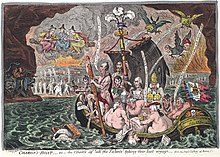Ministry of All the Talents
This article needs additional citations for verification. (December 2013) |

The Ministry of "All the Talents" was a national unity government formed by Lord Grenville on his appointment as Prime Minister of the United Kingdom on 11 February 1806, following the death of William Pitt the Younger.[1]
The first ministry of "All the Talents" lasted from February to December 1806, and the second ministry of "All the Talents" lasted from December 1806 to 1807.
History

With the country remaining at war, Grenville aimed to form the strongest possible government and so included most leading politicians from almost all groupings, although some followers of the younger Pitt, led by George Canning, refused to join.
The inclusion of Charles James Fox raised eyebrows as King George III had previously been very hostile to Fox, but the King's willingness to put aside past enmities for the sake of national unity encouraged many others to join or support the government as well. The ministry boasted fairly progressive agenda, much of it inherited from Pitt.
The Ministry of All the Talents had comparatively little success, failing to bring the sought-after peace with France. In fact, the war continued for nearly another decade. It did, however, abolish the slave trade in Britain in 1807 before breaking up over the question of Catholic emancipation.
It was succeeded by the Second Portland Ministry, headed by William Cavendish-Bentinck, 3rd Duke of Portland.
Other uses of the term
The term has since been used in politics to describe an administration with members from more than one party or even a non-coalition government that enjoys cross-party support due to gifted and/or non-partisan members. Examples include the coalition government which led Great Britain through the Second World War and the Canadian government that won the 1896 election.[2]
List of Ministers
Members of the Cabinet are in bold face.
References
- ^ Lord William Wyndham Grenville
- ^ John Holland Rose (1929). The Cambridge history of the British Empire: The Growth of the new Empire (Google books). Cambridge University Press. p. 511.
- ^ known as Viscount Howick from 11 April 1806
- ^ also Treasurer of the Navy
- ^ also Vice-President of the Board of Trade

